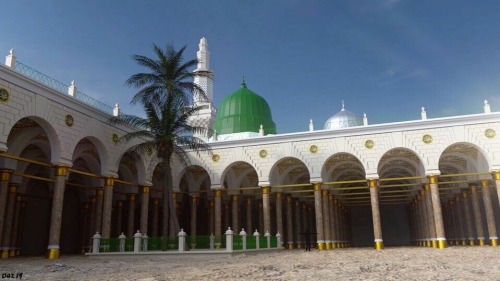A Muslim Renaissance

The reasons are many behind the falling respect for Muslims but trigger a revival we must.
Accused of separatism, unresponsiveness to change, and even of corona spread, Muslims increasingly find themselves in impossible situations in one or other part of the world now.
But things weren’t like this always. Turn the pages of history, which would tell that from the 7th century till the 17th century, Muslims had some stake in world matters. After that, they had been sidelined and gradually eclipsed. There are economical and socio-political reasons for it. To add to all this, hatred against them has increased manifold in many parts of the world. This issue needs to be understood, and reasons ascertained.
Often it is attributed to a steady decline in the importance of education and scientific excellence in Muslim society. Reasons for this gradual decline have to be found and analysed in the right perspective. The development of every civilisation is influenced by the inheritance it got from the earlier ones. It stands true for the Islamic civilisation as well.
The Golden Era
Muslims experienced their best time around the 7th century. The golden age of Muslims, ie, the 7th century with Abbasids in Baghdad saw large-scale translation of works of Greek philosophers, namely Plato, Aristotle, and Galen. Bait ul Hikma (house of wisdom) was established, which involved scholars from all over the world. This house of knowledge reached its zenith during the time of Caliph Mamun, ie, from 813 AD to 833 AD. These scholars often built on ideas provided by ancient writers and their works resulted in significant advancements in algebra, trigonometry, decimals and medical sciences.
Ibn Sina wrote Qanun, which was a widely used book of medicine for many centuries. Al Nafisi obtained excellent results on blood circulation and Abu Qasim al Zahrawi in surgery. In this age, the world saw the development of teaching hospitals. Muslims also contributed to significant progress in astronomy, which as per some historians, formed the basis of Nicolaus Copernicus’ discovery of solar system.
Ibn al-Haytham (known in the West as Alhazen) is known as the father of optics as he propounded the laws of reflection. His research formed the basis for the pinhole camera. Al Biruni is known as the first anthropologist, who introduced India to the Islamic world. Al Razi wrote a pioneering book about smallpox and measles, providing a clinical characterisation of the diseases. He also discovered alcohol and sulphuric acid. Jabir ibn Hayyan (Geber in West), called the father of chemistry, gave the oldest known systematic classification of chemical substances. He also provided the manual for deriving an inorganic compound from organic materials.
Architecture also got a fillip in this age. Islamic architecture was evident in masjid and madrassas. Another marvel of architectural excellence this time was the Alhambra palace, built between 1238 and 1358 during the rule of Ibn al-Aḥmar (Naṣrid dynasty founder). Later, the Mimar Sinan (Ottomon chief architect) made the skyline of Istanbul attractive with numerous fabulous additions. The magnificence of Islamic architecture is seen in many buildings of that time, such as the Dome of the Rock in Jerusalem, the Alhambra in Granada, Spain, and the Blue Mosque in Istanbul. No doubt, Hellenistic inheritance had a substantial impact on the development of Islamic civilisation.
What Went Wrong
The big question then is if everything was going on so well, what went wrong? Why did the Muslim world saw a sudden decline in scientific temper? This decline in scientific temper was evident recently when some clerics refused to cancel congregational prayers in masjids during the corona pandemic.
Many reasons are attributed to this decline. Some see the reason in Islamic philosophy, ie, a debate between reason and revelation. This debate spreads through in the works of three great Muslim philosophers — Ibn Sina, Al Ghazali, and Ibn Rushd.
Ibn Sina (980 AD to 1037 AD) or Avicenna (to the western world) propounded the theory of the eternity of nature and the importance of cause and effect in all-natural events. It was refuted by Muhammad al Ghazali (1058 AD to 1111 AD) in Tahafut al-Falasifa (The Incoherence of the Philosophers) in the 11th century, who gave the idea that everything is as per the divine will. The seemingly rational philosophy of Ibn Sina was denounced as it was felt it deprived god of many godly qualities. Theologians accepted it readily.
Many think that the Muslim society’s drifting away from science started from here. Mutazalites school of thought was made to go extinct as it was thought they were against religion. Later, Al Ghazali was rebutted by Ibn Rushd (1126 AD to 1198) or Averroes (to the western world) in Tahafut al-Tahafut (‘Incoherence of the Incoherence’). There, he propounded that reason is the most important thing. He stated that if the deep meaning of Quranic verses is understood, both philosophy and theology will draw the same conclusion. Ibn Rushd challenged Al Ghazali by saying that if causal relation is secondary and everything is on divine will, then there is nothing in the world left to learn and know.
A 50-Year Breach
But it was only after 50 years that the theory of Al Ghazali was refuted. The thought process of Muslim society had changed by then. Historian Francois Robinson states that this confusion had kept the Muslim community divided. This meant that science suffered big. To pinpoint, the exact period in which Muslims began turning away from scientific innovation was the 11th century.
Compared to that, Ibn Rushd’s philosophical thought of Islamic civilisation was welcomed with open arms in Europe. They are now seen as responsible for European renaissance. However, some such as Prof Frank Griffel, who specialises in Islamic studies, state that Al Ghazali was not anti-science but promoted science with the divine element in it.
There is another opinion, which states that a system of education known as ‘Nizamiyah’ is more responsible for the decline of science among Muslims. This system of education was given by Abu Ali al-Hassan al-Tusi (1018–1092), which promoted religious education solely and had nothing to do with science or reasoning. They primarily institutionalised religious studies. It became more rewarding for students to go in for religious studies only.
According to many journals, the contribution of the contemporary Muslim world to science is dismal. In fact, the total contribution of all Islamic countries to science amounts to no more than 1%.
The Last Blow
The Islamic golden age, which was full of instances of scientific excellence and innovation, ended with the collapse of the Abbasid caliphate due to Mongol invasions and the Siege of Baghdad in 1258. Mongol ruler Halagu Khan’s invasion of Baghdad had a devastating effect on the scientific journey of Islamic civilisation.
The Mongols practically dismantled the entire city with all 36 libraries, house of wisdom, hospitals, masjids burnt down. Countless historical accounts, books of medicine, science, philosophy, and astronomy were destroyed. Historical accounts tell that the water of Tigris turned black with the debris of burnt books. Many scientists and philosophers got killed while some were taken captive and relocated to the Mongol kingdom. Some historians also state that many of these books found their way to European libraries.
Scientific research lost political and economic patronage and everything went awry. Educational sponsorship of Muslims depended on the curiosity and support of rulers. On the other hand, a trend had developed in Europe whereby businesses and industry started patronising research, and it continued for many centuries.
Another critical reason for the fall had its root in the Ottoman Empire. Influenced by some royal clerics, the Ottoman Sultan had ordered a death penalty for using printing press. This rule remained for the next 270 years, depriving scholars the ease of citation and sharing ideas, which also restricted the reach of knowledge to the masses. Another instance of the primacy of theology was the destruction of the astronomical observatory in Istanbul by Ottoman rulers under the influence of the Royal cleric around 1580. He had been advised that the study of skies would bring some devastating calamity on his people.
The Turnaround
It is now imperative to increase the inclination of Muslims towards scientific education. Specific steps are necessary so that future stimulus can provide desired results. First, all the works of Muslim and western philosophers/scientists must be translated into vernacular languages. For example, in South Asia, it can be in Urdu, while in Malaysia, it can be in Malay. This is necessary since English-understanding Muslims still constitute a minority in the community.
Moreover, knowledge of Arabic too needs to increase as it is not only the language of the Quran but also most of the encyclopedias of the golden age of Islam. Another measure can be creation of endowment funds by the privileged to establish a public library in the main masjid compound of every town. Anybody could take its membership for free and access books easily.
With the internet boom, things are a lot easier. This ease has to be exploited fully for the benefit of Muslims. Narrative for science education should be developed utilising masjid congregations.
Research has proved that even well-to-do Muslims appear disinterested in education. The intent level for learning can be improved by using the services of motivational speakers. A strong team of volunteers on the lines of Tablighi Jamaat can be helpful to draw Muslim masses towards education.
Scientific innovation has to be promoted in a big way with talented human resources. Philanthropists and foundations have to come forward and promote human development by providing research grants and supporting science education.
Majority of Muslims realise the importance of education. However, in many parts of the world, especially in South Asia, they are not able to attend schools because of poverty. Parents see in them as immediate earning hands and think it will be a waste to send them to schools. A few of them start, but they drop out because of monetary constraints. So, it is necessary for education entrepreneurs to focus on skill training centres of electricians, welders and plumbers so that their immediate earning can start.
Many Muslims are artisans in various cottage industries. This trend has been going on from generations. Besides other things, they inherit poverty as well from their elders. These cottage industries generally supply goods to exporters who sell them at huge profits. The poverty of artisans can be eliminated if they are trained in export management. Training schools should be started soon. Improved financial situation can help further the promotion of education in Muslim families as well as society.
Once educational consciousness and scientific awareness increase in the Muslim society, things will change for the better and perception about them will automatically improve. Let the journey towards revival and respect begin in earnest.
( Source: Telengana Today )
Topics: History, Islamic Culture And Civilization, Islamic Golden Age, Ramadan
Views: 4539
Related Suggestions

















